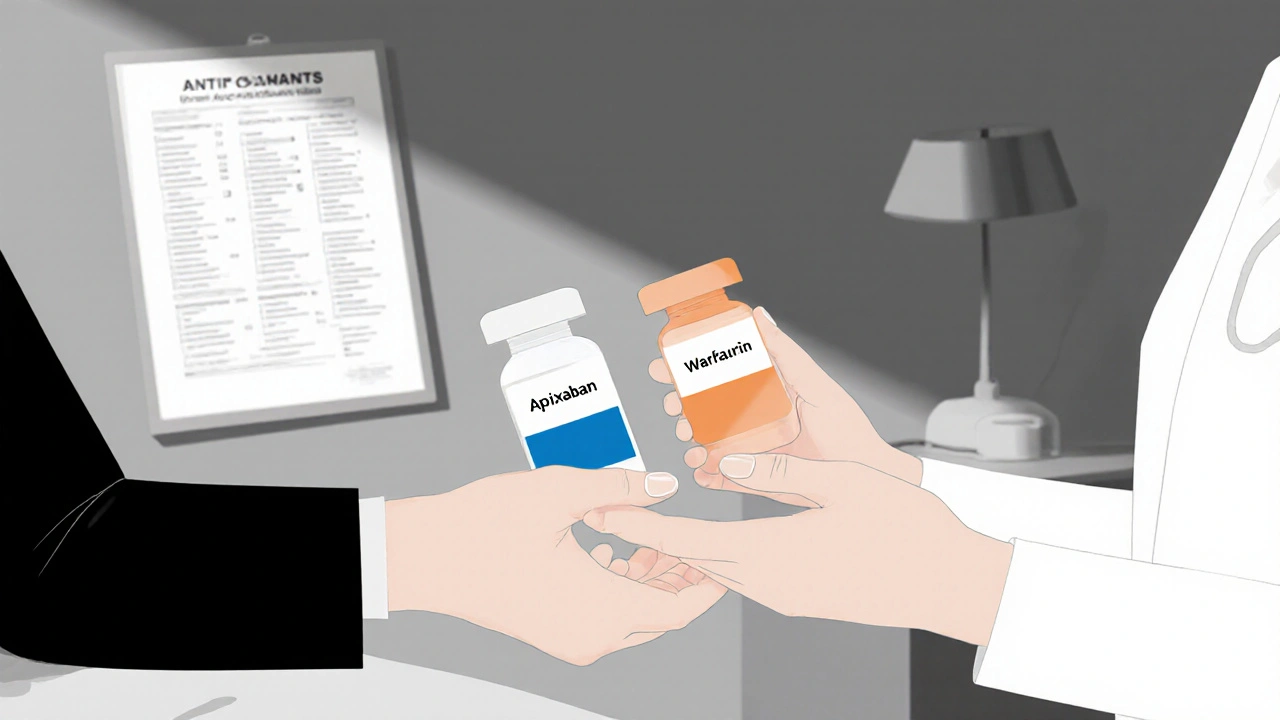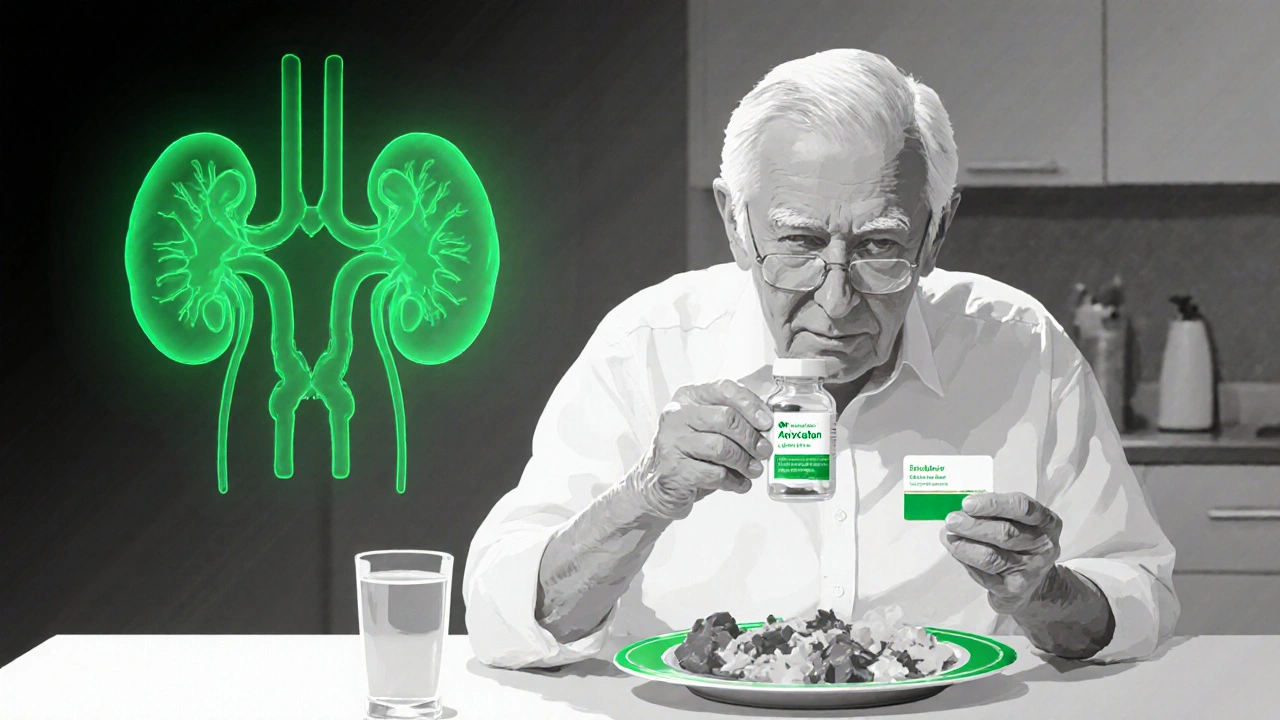Managing atrial fibrillation (AF) isn’t just about controlling a fast heartbeat; it’s about preventing the dangerous clots that can cause stroke. apixaban has become a go‑to option for many clinicians because it offers reliable protection with fewer monitoring hassles than older drugs.
Quick Takeaways
- Apixaban is a direct Factor Xa inhibitor approved for stroke prevention in non‑valvular AF.
- The ARISTOTLE trial showed a 21% lower risk of stroke compared with warfarin, with less major bleeding.
- Typical dose is 5mg twice daily; reduced to 2.5mg twice daily in patients with ≥2 of age≥80, weight≤60kg, or serum creatinine≥1.5mg/dL.
- Reversal is possible with andexanet alfa, and emergent bleeding can be managed with pro‑hemostatic agents.
- Regular kidney function checks and adherence to dosing schedule are crucial for safety.
What Is Atrial Fibrillation?
Atrial Fibrillation is a rapid, irregular heart rhythm that affects about 3% of adults in the United Kingdom, and its prevalence rises sharply after age 65. The erratic electrical signals cause the atria to quiver instead of contracting fully, which promotes blood stasis and clot formation, especially in the left atrial appendage. These clots can travel to the brain, leading to ischemic stroke-a leading cause of disability and death.
Why Anticoagulation Matters in AF
Anticoagulants reduce the risk of clot formation by interfering with the coagulation cascade. In AF, the goal is to keep the blood thin enough to prevent stroke while avoiding excessive bleeding. Until the early 2000s, warfarin was the only oral option, but its need for regular INR monitoring and dietary restrictions made management cumbersome.
Apixaban: A Direct Factor Xa Inhibitor
Apixaban is a selective, reversible inhibitor of Factor Xa, an enzyme crucial for converting prothrombin to thrombin. By blocking this step, apixaban prevents fibrin clot formation without affecting platelet function. It was approved by the FDA in 2012 for stroke prevention in non‑valvular AF and quickly gained acceptance in the UK and Europe.

Clinical Evidence - The ARISTOTLE Trial
The pivotal ARISTOTLE study enrolled 18,201 patients with AF and at least one risk factor for stroke. Participants were randomized to apixaban 5mg twice daily or dose‑adjusted warfarin (target INR 2.0-3.0). Over a median follow‑up of 1.8years, apixaban achieved:
- Stroke or systemic embolism: 1.27% vs 1.60% (hazard ratio 0.79)
- Major bleeding: 2.13% vs 3.09% (hazard ratio 0.69)
- All‑cause mortality: 3.52% vs 3.94% (hazard ratio 0.89)
These results demonstrate that apixaban not only lowers stroke risk but also does so with a safer bleeding profile compared to warfarin.
Dosing, Renal Adjustment, and Safety
The standard dosing regimen is 5mg taken orally twice daily. Dose reduction to 2.5mg twice daily is recommended when a patient meets at least two of the following criteria:
- Age≥80years
- Body weight≤60kg
- Serum creatinine≥1.5mg/dL (or estimated GFR<30mL/min)
Apixaban is metabolized primarily by CYP3A4 and excreted partially by the kidneys (≈27%). In severe renal impairment (CrCl<15mL/min), avoid use because exposure rises markedly.
Common side effects include minor gastrointestinal upset and bruising. Serious bleeding is less frequent than with warfarin, but clinicians should watch for signs of intracranial hemorrhage, especially in patients with prior stroke.
Comparing Apixaban with Other Oral Anticoagulants
| Drug | Mechanism | Standard Dose | Renal Clearance | Major Bleeding Rate (% per year) |
|---|---|---|---|---|
| Apixaban | Factor Xa inhibitor | 5mg BID | 27% | 2.1 |
| Warfarin | Vitamin K antagonist | Dose‑adjusted (INR 2‑3) | Negligible | 3.1 |
| Dabigatran | Direct Thrombin inhibitor | 150mg BID | 80% | 2.7 |
| Rivaroxaban | Factor Xa inhibitor | 20mg QD | 35% | 2.6 |
Apixaban’s lower renal clearance makes it a safer choice for patients with moderate kidney disease, while its twice‑daily schedule can improve adherence compared with once‑daily rivaroxaban for some individuals.

Who Benefits Most from Apixaban?
Patients who are good candidates include:
- Those with CHA₂DS₂‑VASc score ≥2 (men) or ≥3 (women), indicating high stroke risk.
- Individuals with a history of gastrointestinal bleeding where warfarin’s variable INR could increase risk.
- Patients on multiple medications that interact with CYP3A4, provided strong inhibitors/inducers are avoided.
- Elderly patients who may struggle with frequent INR clinic visits.
Conversely, apixaban should be avoided in patients with active major bleeding, severe hepatic impairment (Child‑Pugh C), or those taking concomitant strong dual inhibitors of both CYP3A4 and P‑glycoprotein.
Managing Bleeding Risks and Reversal
If major bleeding occurs, the specific reversal agent Andexanet Alfa binds to Factor Xa inhibitors and restores hemostasis. The dosing protocol depends on the amount of apixaban taken and the timing of the bleed. When the reversal agent isn’t available, clinicians can resort to pro‑thrombin complex concentrates (PCC) or activated PCC, though evidence is less robust.
For minor bleeds, temporary dose interruption and local measures (e.g., compression) are usually enough. Restarting apixaban after a bleed should follow a risk‑benefit assessment; most guidelines suggest waiting 24‑48hours if hemostasis is secured.
Practical Tips for Patients on Apixaban
- Take with food - the drug’s absorption improves when taken with meals, especially the 5mg dose.
- Stick to the schedule - missing a dose increases stroke risk; if a dose is missed, take it as soon as remembered unless it’s close to the next dose.
- Monitor kidney function - a serum creatinine test at least annually, more often if you have CKD.
- Avoid strong CYP3A4 inhibitors like ketoconazole or certain antivirals unless your doctor adjusts the dose.
- Inform healthcare providers - always tell doctors, dentists, and pharmacists you’re on apixaban before any procedure.
- Carry a medication card - a simple card stating “Apixaban 5mg BID, last dose time” helps emergency teams.
Adherence is the single biggest predictor of success; apps or pillboxes can be lifesavers.
Frequently Asked Questions
Can I take apixaban if I have a history of stomach ulcers?
Apixaban carries a lower risk of gastrointestinal bleeding than some other DOACs, but it’s still a blood thinner. If you’ve had recent ulcer bleeding, discuss protective measures (e.g., PPIs) with your doctor before starting.
Do I need regular blood tests while on apixaban?
Routine coagulation tests aren’t required, but kidney function should be checked at least yearly. In special circumstances (e.g., surgery), a specific anti‑Xa assay may be ordered.
What should I do if I miss a dose?
Take the missed dose as soon as you remember unless it’s within 12hours of the next dose. In that case, skip the missed one and continue with the regular schedule. Never double‑dose.
Is there an antidote for apixaban in case of emergency?
Yes. Andexanet alfa is the FDA‑approved reversal agent for Factor Xa inhibitors, including apixaban. It’s typically reserved for life‑threatening bleeding or urgent surgery.
Can I switch from warfarin to apixaban without a washout period?
Transitioning is straightforward. Stop warfarin when your INR falls below 2.0, then start apixaban the next day. No overlap is needed because apixaban works quickly.
In short, apixaban offers a modern, convenient way to keep AF patients safe from stroke while minimizing bleeding worries. By understanding dosing rules, renal considerations, and reversal options, both clinicians and patients can make the most of this therapy.

12 Responses
Great overview! Apixaban really shifts the game for AF patients 🙌. The reduced monitoring makes life easier for both doctors and patients.
Remember to check kidney function regularly-it's key for safety.
Keep spreading the word! 😊
Did anyone notice how the pharma giants push apixaban like a miracle drug while quietly hiding the side‑effects? The ARISTOTLE trial sounds perfect on paper, but who funded it?
I bet there's a hidden agenda to lock us into pricey meds. Wake up, folks! The bleeding risk might be understated, and the reversal agent is a cash grab. Trust no one.
The pharmacodynamics of apixaban merit careful discussion. By selectively inhibiting Factor Xa, it circumvents the need for routine INR surveillance, thereby enhancing patient adherence.
Nonetheless, clinicians must remain vigilant regarding renal impairment, as accumulation may precipitate hemorrhagic events.
Moreover, the availability of andexanet alfa offers a valuable antidote, albeit at considerable expense.
In sum, the therapeutic profile is favorable when applied judiciously.
Look at the numbers-21% lower stroke risk and a 31% reduction in major bleeding. Yet the real story is how insurers love this drug because it slashes long‑term costs.
Meanwhile, patients who can’t afford the brand are left scratching their heads, waiting for a generic that never arrives.
The healthcare system is a theater, and apixaban is the star performer on a gilded stage.
In the grand tapestry of human health, apixaban is but a single thread, yet it weaves a pattern that defies the chaos of atrial fibrillation. When the heart's rhythm falters, the blood's silent march threatens the fragile sanctity of the brain.
By binding to Factor Xa, this potion whispers a promise of peace, but we must heed the subtle warnings of our kidneys.
Thus, medicine becomes a dialogue between science and soul.
People think apixaban is just a pill, but it's a leash on their lives. If you miss a dose, you feel the dread creeping in.
The fear of stroke becomes a constant shadow. And the doctors? They just hand you another prescription and walk away.
Apixaban certainly offers advantages over warfarin, especially regarding routine monitoring. However, it's important to weigh the individual patient's renal function before committing to a dosing regimen.
Shared decision‑making ensures that patients understand both benefits and potential risks. I appreciate the thoroughness of the article in highlighting dose adjustments.
Hey folks, just wanted to add a splash of color to this discussion! Think of apixaban as the reliable sidekick in the superhero saga against AF-always ready, rarely demanding applause.
The bi‑weekly blood checks that haunted warfarin patients are now a thing of the past. Still, keep an eye on those creatinine numbers; even heroes need a check‑up.
Stay safe and keep the rhythm rolling!
Don't romanticize a drug that can still bleed you out! Your sunshine analogies ignore the hard truth: apixaban's reversal agent costs a fortune, and hospitals scramble when massive bleeding occurs.
Patients deserve brutal honesty, not fluffy metaphors. If you can't see the danger, maybe you're too blinded by optimism.
The data looks solid, but any drug is only as good as its monitoring.
Solid? More like a polished spin-don’t forget the hidden costs and the fact that pharma controls the narrative, shaping what we call 'solid' evidence.
Apixaban has truly reshaped the therapeutic landscape for atrial fibrillation, and that's something worth celebrating.
When you think about the sheer number of patients who once wrestled with warfarin's dietary restrictions, the freedom offered by a direct Factor Xa inhibitor feels like a breath of fresh air.
The ARISTOTLE trial, with its impressive reduction in stroke and major bleeding, provides a robust backbone for clinical confidence.
Yet, no medication is a magic bullet; the importance of renal function monitoring cannot be overstated, especially in the elderly.
Regular creatinine checks act as a compass, guiding dose adjustments that keep the treatment both safe and effective.
Moreover, the availability of andexanet alfa as a reversal agent adds an extra layer of security, even though its cost may raise eyebrows.
From a pharmacoeconomic standpoint, the reduced need for INR visits translates into tangible savings for both patients and healthcare systems.
Patients report higher adherence rates simply because they no longer have to schedule weekly blood draws.
That adherence boost directly correlates with the observed decline in stroke incidence, completing a virtuous cycle.
When clinicians personalize the dose-5 mg twice daily or the reduced 2.5 mg in qualifying individuals-the strategy becomes truly patient‑centric.
This nuance reflects a broader shift toward precision medicine, where 'one size fits all' is rapidly becoming obsolete.
It's also worth noting that the drug's pharmacokinetics offer a predictable profile, minimizing unexpected peaks that could precipitate bleeding.
In real‑world practice, I've seen families breathe easier knowing their loved ones are on a regimen with fewer surprises.
Of course, vigilance remains essential; any sign of gastrointestinal bleeding should prompt immediate evaluation.
Ultimately, apixaban's blend of efficacy, safety, and convenience makes it a cornerstone in AF management.
So, keep the conversation going, stay informed, and empower patients to take charge of their heart health!